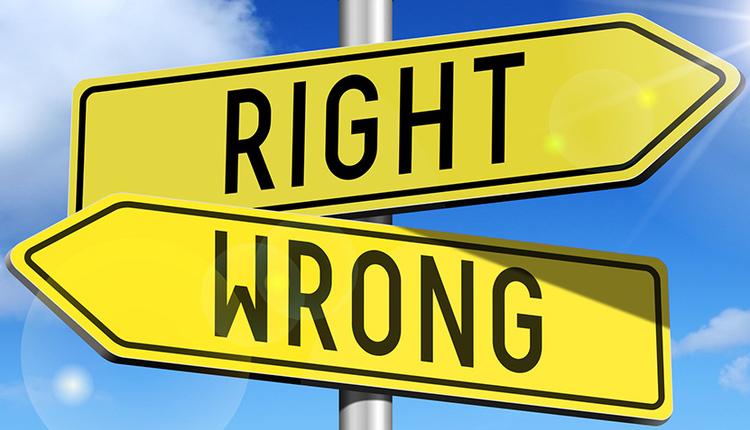
The study of dogma has historically been segregated to religious contexts, but in reality, all facets of life are subject to dogmatic thinking. The Greek word dogma essentially translates to “opinion, tenet” and was adopted in to the English language in the 16th century. Any topic, from food, to education, to government, and of course even exercise, can elicit strict ideologies from us. We have a natural tendency to need to be right. The workout plan we choose to do has to be “correct” or we are doing the “wrong thing.” Thus, what we do becomes a part of who we are, and naturally, we must protect who we are at all costs. Enter dogmatic thinking. “Heavy weightlifting delivers the best outcome for our health, so why would you do anything else?” or “low impact intervals keep us healthy and safe, proven to be the best by science.” If we know that we are right, why would we ever look for any other information.
Thinking we are correct is actually a necessity, otherwise we would never be able to make decisions. So if it’s a natural human behavior to think we are right, is there anything wrong with it? Why do we have such a hard time changing our mind or holding broad perspectives? And how can we better assess beliefs and information to benefit ourselves as fit pros and the wellness of our community?
The Way Our Mind Works
We make, on average, over 35,000 decisions a day and most of these (up to 99%) we usually leave up to habit and our subconscious. Various subconscious decision making rules of thumb, known as Heuristics, help us make decisions, but that doesn’t always mean they lead us the right way. Heuristics and cognitive fallacies like confirmation bias, the Dunning-Krueger Effect and social proof can make it hard to keep broad perspectives. As much as we like to think that we are able to make well informed decisions, based off of facts and reasoning, we are more often subject to influence by the people we associate with, the physical environment we are in, the last news clip we saw, or even the mood we are in.
University of Arizona Professor Robert Cialdini, in his recently re-released book Influence, writes about the Powers of Persuasion. Among the 7 major factors he lists is Social Proof, a consensus of the people in our in-group, and suggests that a number of those 35,000 decisions we make MUST rely on things like social proof because we would be overwhelmed if we had to weigh the full costs of every decision we make daily. With every decision comes the risks of choosing wrong and the opportunity costs of not choosing the other options. This, according to behavioral science experts, puts us in the position to need to rationalize our decisions as “the best option.”
In many instances, especially the major ideological decisions in life, we can be threatened by new, counter information. In an effort to protect ourselves we might even actively ignore that info. Professionals in any industry often find themselves succumbing to Imposter Syndrome, a psychological pattern where an expert is aware of how much there is to know, and never feels “satisfied” that they know enough about their topic or field. For example, a psychology researcher might hesitate to say that a finding is absolutely true, since they know there is always more research to be done. In contrast, the Dunning-Kruger effect, named for the researchers who coined it, refers to a cognitive fallacy where the subject is unaware that they lack ability or knowledge, and therefore don’t seek out any new info. This, of course, can prevent growth. As mentioned before, our identity is important, and we must protect it, but why is new information such a threat?
The Way Society Works
Being human comes with endless nuances, both exciting and burdensome. But being part of something… is everything. We are social beings and we look to our in-group for help in making decisions. Therefore, it can be risky to subscribe to ideas that differ from our community, both to our connections with those people, and to our own identity. Our in-group can be broad or narrow, and can change depending on the context of a decision or even the place we are standing when the decision is made. If I’m at a family reunion, I can eat as much cake and pie as I want without it reflecting on me, but if I’m at a personal training convention, I may act differently in an effort to appear more like my cohort (or what I think my cohort wants to be like).
Michele Gelfand, Professor of Psychology at the University of Maryland, uses the terms loose and tight to describe how different cultures approach norms. For example, Japan is generally a tight culture, in which the entire nation shares the same practice of not talking on speaker phone in public, and expect the same behavior of others. In Los Angeles however, a more loose culture, that practice might be expected in some social groups, family units or at church, but not necessarily in general. Yuval Noah Harari, the Historian who wrote the popular book Sapiens, comments that harnessing fire, or the opposable thumb, aren’t necessarily the tools that projected Homo Sapiens (that’s us) to our “elite” status among species. But, instead, it is our ability to gossip. Or, more scientifically, to discuss abstract things, make plans and talk about other people or animals.
Understanding the norms, practices and objectives of the people you are with is evolutionarily safe and supportive. It’s easy to see why it can be hard to lose the thing you have, in this case the group that you go to yoga with, or the camaraderie of your martial arts group. Therefore, not sharing those same norms can be a threat.
The Way We Work
How can we better regulate the way we listen, learn, teach and ultimately make decisions? It can sometimes be difficult to have multiple views on one topic. After all, we are often taught that in order for something to be right, something else has to be wrong. Therapist Mel Schwartz L.C.S.W. suggests that more individualistic societies, like that of the US, tend to link identity and failure with being right or wrong, which make it risky to allow for any ambiguity in decisions or interests. But in order to bare the infinite amount of decisions we make, and not risk potential feelings of loss, we have to set certain “parameters.”
"Being dogmatic can prevent us from adjusting our approach when there is new information, or when a clients’s individual requirements might benefit from a different approach” says Nick Tumminello, CPT. Tumminello is an expert in programming and exercise mechanics and suggests that “knowing that something DOES work is different than knowing WHY it works, and both are equally important. Heavy lifting will work for client A, but client B may feel uncomfortable, and therefore won’t commit”. Here is where a trainer or coach can benefit from a different approach, or at least an understanding of where to refer that client. Perhaps the most difficult task about avoiding dogma in the fitness industry is the fact that just about every modality, program or form… is correct. You would be hard pressed to find any exercise that is not healthy for people. There are obvious movements and practices that might not work for an individual, but in general EXERCISE IS GOOD FOR YOU. Therefore, whichever practice a person does subscribe to, will often be correct, and could possibly perpetuate their dogmatic view.
Humans thrive on both novelty and comfort. But our brains, minds and bodies do have a limited capacity. So it is completely normal to want to feel right. It can make it much easier to bare the endless nuances of being human. But confusion, and choice overload, can often keep members of the community from engaging or thriving in a proper exercise program. Too many mixed messages, and no permission to “try things out” make it hard for an individual to start exercising in the first place.
Let’s all take a moment to step back, appreciate our preferred modalities for their value, and realize that there are many ways to be right. Karl Albrecht Ph.D., an executive management consultant, provides a simple practice to help avoid dogmatic thinking. To help avoid the usual feelings of "guilt, shame, inadequacy or self-disapproval that we too often attach to our mistakes,” and that prevent us from sometimes making helpful decisions, we can practice saying the following in less impactful situations:
• “I don’t know.”
• “I made a mistake.”
• “I've changed my mind.”
Behavioral psychology and the scientific process can help us better understand ourselves, the way we think, and subsequently provide us a healthier perspective on… health.












